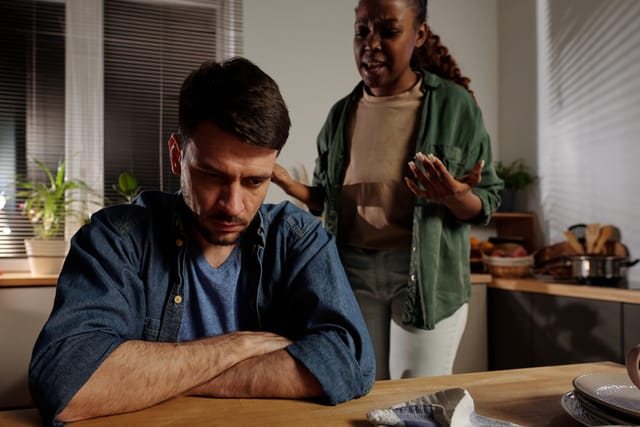Do arguments blow up into big dramas? Do people seem to walk on eggshells around you? It’s easy to blame the other person, but consistent conflict in your relationships might mean it’s time to look inward. Let’s discuss the less-obvious signs that YOU might be fueling that chaos.
1. Every Conversation’s a Battlefield.

Do simple disagreements always blow up into full-on fights? Does every chat feel like walking on eggshells? If drama seems to follow you around, it might be time for some honest self-reflection. Working on communication skills and conflict resolution techniques can teach you to de-escalate situations before they explode.
2. You’re Always the Victim.

Nothing’s ever your fault, right? It’s the world against you! If you find yourself constantly playing the blame game and never accepting responsibility, you might be contributing to the conflict instead of resolving it. Learning to take ownership of your role, even if small, can help break the deadlock and get you closer to solutions.
3. Your Emotions Run the Show.

Are you quick to anger, easily hurt, or always feeling defensive? When intense feelings take control, miscommunication and misunderstandings are bound to happen. Taking a step back before reacting can help diffuse tense situations. Practicing mindfulness techniques and emotional regulation skills can help you process strong emotions more constructively.
4. “Always” and “Never” are Your Best Friends

Do you throw around words like “always” and “never” in arguments? This kind of all-or-nothing mindset can fuel conflict and shut down constructive communication. Remember, things are rarely black and white. Challenging those extreme thoughts and focusing on specifics can help you find a more nuanced perspective.
5. You Have to Have the Last Word.

Is “winning” an argument more important than finding a solution? If you always need to have the last say, even on minor issues, it might signal a need for control that’s pushing people away. Focusing on seeking compromise instead of domination can lead to more harmonious outcomes in your relationships.
6. It’s Past vs. Present All the Time.

Do you drag up old baggage into every argument? Holding onto grudges and bringing up past issues prevents moving forward and creates constant tension. Focusing on addressing the current issue, even if it triggers past hurts, is key to breaking the negative cycle.
7. You Can’t Listen to Save Your Life.

When someone’s talking, are you actually listening or just planning your counterattack? Real communication is a two-way street, and understanding another’s perspective is key to resolving conflicts. Practicing active listening skills can help you engage with others more meaningfully and uncover the root of disagreements.
8. Apologies? Not in Your Vocabulary.

Saying “I’m sorry” can feel impossible, even when you’re in the wrong. A sincere apology can go a long way in mending relationships and diffusing tense situations. Learning to genuinely acknowledge your mistakes shows a willingness to take responsibility and fosters stronger connections.
9. You Create Chaos Everywhere You Go.

Do you somehow insert yourself into other people’s conflicts, even when it’s none of your business? While offering help can be noble, getting entangled in everyone else’s drama can add fuel to the fire instead of resolving anything. Learning to set boundaries and when to step back can prevent you from getting caught in the crossfire.
10. You Thrive on Gossip.

Is spreading juicy tidbits and hearing about other people’s problems your secret hobby? Gossip creates a toxic environment of mistrust and negativity. Staying focused on your own life and resisting the urge to dish the dirt can help build healthier relationships.
11. It’s Your Way or the Highway.

Are you inflexible and unwilling to compromise? If things always have to go your way, reaching an agreement with others becomes nearly impossible. Embracing flexibility and considering alternative viewpoints is crucial for healthy collaboration.
12. Passive Aggression Is Your Weapon.

Instead of directly addressing issues, do you resort to sarcastic remarks, backhanded compliments, or the silent treatment? Passive aggression sabotages communication and leaves others feeling confused and hurt. Learning to express your needs and frustrations assertively is key to healthier conflict resolution.
13. You See Betrayal Everywhere.

Are you constantly suspicious of others’ motives, convinced that friends and partners are secretly out to get you? This kind of distrustful mindset makes collaboration difficult and pushes people away. Working on building trust and recognizing that not every action is a personal attack can help you build stronger connections.
14. Everyone Else is Oversensitive.
When someone expresses hurt caused by your words or actions, do you brush it off with “Can’t you take a joke?” or “You’re just too sensitive”? Minimizing others’ feelings invalidates their experiences and prevents you from taking ownership of your impact. Developing empathy and understanding different perspectives is crucial for fostering respectful relationships.
15. Holding Grudges Is Your Superpower.
Forgiveness? Forget about it! If you hold onto past hurts and refuse to let go, resentment and bitterness will poison your present relationships. Practicing forgiveness (not for the other person, but for yourself) can help free you from past pain and open a path towards healthier connections.
Enjoy this piece? Give it a like and follow Bolde on MSN for more!





